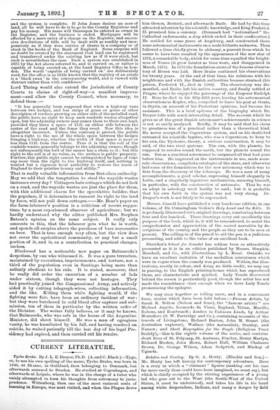CURRENT LITERATURE.
Tycho Brahe. By J. L. E. Dreyer, Ph.D. (A. and C. Black.)—Tyge, or, to use his own spelling of the name, Tycho Brahe, was born in 1546, at Skmne, in Gothiand, then belonging. to Denmark, but afterwards annexed to Sweden. He studied at Copenhagen, and afterwards at Leipsic, where he was in the charge of a tutor who vainly attempted to turn his thoughts from astronomy to juris- prudence. Wittenberg, then one of the most eminent seats of learning in Europe, was next visited, and when the Plague drove him thence, Rostock, and afterwards Basle. He had by this time attracted attention by his scientific knowledge, and King Frederick II. promised him a canonry. (Denmark had " nationalised " the Cathedral endowments, a step which ended in their confiscation.) He resided for some years at Augsburg, and constructed there some astronomical instruments on a scale hitherto unknown. Then followed a time chiefly given to alchemy, a pursuit from which ho seems to have been recalled by the appearance of the new star of 1572, a remarkable body, which for some time equalled the bright- ness of Venus (it grew fainter as time went, and disappeared in March, 1574). In 1576 the foundation-stone of the famous observa- tory of Hveen was laid. Here Brake continued his observations for twenty years. At the end of that time, his relations with his neighbours and with the Danish authorities became strained (his patron, Frederick II., died in 1588). The observatory was dis- mantled, and Brake left his native country, and finally settled at Prague, where he enjoyed the patronage of the Emperor Rudolph II. Here he died in his fifty-fifth year, leaving his astronomical observations to Kepler, who, compelled to leave his post at Gratz, in Styria, on account of his Protestant opinions, had become his assistant. This is a brief epitome of the biography which Dr. Dreyer tells with much interesting detail. The account which he gives us of the great Danish astronomer's achievements in science is not so easily analysed. Briefly, it may be said that his claim to greatness was of a practical rather than a theoretical kind. He never accepted the Copernican system, and on his death-bed entreated his scientific legatee, who was a Copernican, to keep to his own, the Tychonic, theory, a curious combination, it may be said, of the two rival systems. The sun, with the planets, he supposed to revolve round the earth, but the planets round the sun. But as a practical astronomer he surpassed all that had gone before him. He improved on the instruments in use, made accu- rate observations, compiled a catalogue of the stars, and otherwise laid some of the foundations for the new astronomy which was to date from the discovery of the telescope. He was a man of many accomplishments, a good scholar, expressing himself elegantly in Latin, and a singularly ingenious mechanician, amusing himself, in particular, with the construction of automata. That he was an adept in astrology need hardly be said ; but it is probable that his own faith in the system was not very strong. Dr. Dreyer's work is not likely to be superseded.
Messrs. Cassell have published a very handsome edition, in one volume, of Dr. Cunningham Geikie's Holy Land and the Bible. It is profusely illustrated with original drawings, numbering between four and five hundred. These drawings carry out excellently the purpose of the book, which is, it will be remembered, to assist the comprehension and appreciation of the sacred narrative by de- scriptions of the country and the people as they are to be seen at present. The calling in of the pencil to aid the pen is a judicious proceeding, and adds to the value of an excellent book.














































 Previous page
Previous page